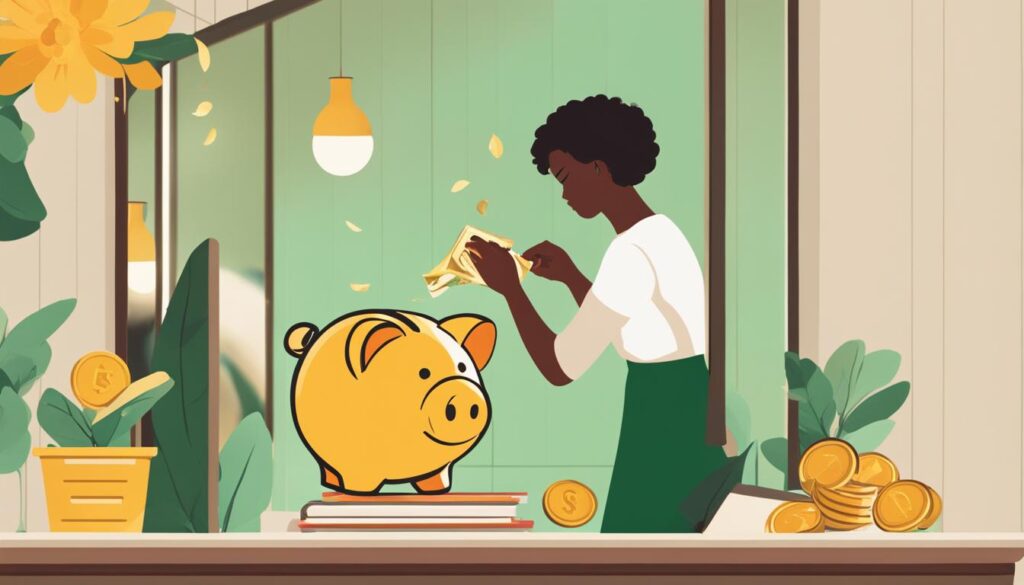Practicing gratitude can have a profound impact on your financial well-being. It goes beyond saying “thank you” and encompasses a mindset of appreciation that extends to your money and resources. By cultivating a gratitude practice, you can shift your perspective, find contentment in your financial situation, make mindful spending and saving choices, strengthen your relationships, and attract abundance.
Key Takeaways:
- Practicing gratitude can transform your money mindset and lead to financial well-being.
- Cultivating a sense of gratitude helps you find contentment in your current financial situation.
- Mindful spending and saving are enhanced through the practice of gratitude.
- Expressing gratitude strengthens your relationships, particularly those related to finances.
- By adopting an attitude of gratitude, you can attract financial abundance into your life.
The Influence of Gratitude on Money Mindset
Gratitude is a powerful tool that enables us to shift our perspective on money. Rather than focusing solely on what we lack or our financial goals that are yet to be achieved, gratitude allows us to appreciate and acknowledge the blessings we currently have. This shift in perspective brings a sense of contentment and reduces the tendency to constantly strive for more, helping us make wiser financial decisions.
When we cultivate a money mindset rooted in gratitude, we develop a deeper understanding of the value that money holds beyond mere accumulation. We begin to see money as a means to support our well-being, fulfill our needs, and contribute to our goals and aspirations.
By embracing gratitude, we free ourselves from the never-ending pursuit of material possessions and status symbols. We find joy and fulfillment in the simple pleasures that money can provide, such as spending quality time with loved ones, enjoying hobbies, or investing in experiences that enrich our lives.
“Gratitude turns what we have into enough.”
Practicing gratitude also helps us develop resilience and navigate financial challenges with a positive mindset. It allows us to find silver linings in difficult situations, recognize the lessons that adversity brings, and adapt our financial strategies accordingly. Gratitude helps us maintain a sense of hope and optimism, even during tough times.
When our money mindset is rooted in gratitude, we make deliberate and thoughtful financial choices. We prioritize spending on things that align with our values and provide long-term fulfillment, rather than succumbing to impulsive or frivolous purchases.
Gratitude fosters a greater sense of abundance, shifting our focus from scarcity to abundance. We start to see opportunities for growth, progress, and success, even in challenging financial circumstances. This perspective shift allows us to attract more positive financial experiences and create a harmonious relationship with money.
Shift Your Money Mindset with Gratitude
Here are some actionable tips to incorporate gratitude into your daily financial practices:
- Keep a gratitude journal: Take a few minutes each day to write down three things you are grateful for in your financial life.
- Express appreciation to your loved ones: Let your family and friends know how grateful you are for their financial support, advice, and encouragement.
- Practice mindful spending: Before making a purchase, pause and consider if it aligns with your values and brings genuine joy.
- Volunteer or donate: Giving back to others cultivates gratitude and creates a positive ripple effect.
- Embrace small moments of financial contentment: Celebrate every financial milestone, no matter how small, and savor the progress you’ve made.
Remember, it’s not about the amount of money you have, but rather the mindset you cultivate around it. By embracing gratitude in your financial journey, you can transform your money mindset and pave the way for a more fulfilling and abundant financial life.
Cultivating Financial Contentment Through Gratitude
In a consumer-driven society, it’s easy to get caught up in the pursuit of more. However, practicing gratitude can help us break free from this never-ending cycle and cultivate a sense of financial contentment. Financial contentment is the ability to find joy and satisfaction in what we already have, rather than constantly striving for more.
By incorporating gratitude into our lives, we can shift our focus from what we lack to what we have been blessed with. It’s about appreciating the simple pleasures and being grateful for the resources we possess. When we develop this sense of contentment, we become less inclined to engage in unnecessary spending or accumulate debt in pursuit of external validation.
Practicing gratitude encourages us to embrace a mindful spending mindset. It helps us discern between our needs and wants, making us more aware of our spending patterns. By being grateful for the resources we have, we become intentional about how we allocate our financial resources. Mindful spending allows us to prioritize what truly matters to us and make financial decisions aligned with our true values and priorities.
“Gratitude turns what we have into enough.”
When we approach our finances with gratitude, we learn to derive fulfillment from the present moment. We appreciate the inherent value in experiences and relationships rather than relying on material possessions for happiness. This shift in mindset frees us from the constant pressure to accumulate more and helps us live a more fulfilling and balanced life.
The Benefits of Cultivating Financial Contentment
By cultivating financial contentment through gratitude, we experience a range of benefits that positively impact our overall well-being and financial health:
- Reduced stress: Gratitude helps us release the burden of constantly chasing after material possessions, reducing financial stress and enhancing our overall well-being.
- Improved relationships: When we appreciate the support and contributions of our loved ones, it strengthens our relationships and fosters collaboration in financial decision-making.
- Sustainable financial habits: A mindset of financial contentment encourages us to practice mindful spending and saving, leading to sustainable financial habits that support our long-term goals.
- Enhanced financial security: By prioritizing what matters most and making intentional financial decisions, we create a solid foundation for long-term financial security.

| Financial Contentment | Financial Discontent |
|---|---|
| Gratitude for what we have | Constant desire for more |
| Mindful spending and saving | Impulsive buying and debt accumulation |
| Balanced and fulfilling life | Emotional emptiness and dissatisfaction |
Mindful Spending and Saving Through Gratitude
Gratitude cultivates mindfulness, which plays a critical role in making deliberate financial decisions. When we practice gratitude, we become more attuned to our spending patterns and develop a heightened awareness of whether our purchases align with our values and long-term goals.
We learn to differentiate between our needs and wants, enabling us to avoid impulsive buying and prioritize mindful spending. With a mindful spending approach, we carefully consider the impact of our financial choices and focus on making purchases that truly enhance our well-being and align with our values.
By practicing gratitude, we recognize the importance of preserving and growing the resources we have. It encourages us to consider the long-term implications of our financial decisions, leading us to save and invest responsibly. When we are grateful for the financial security we possess, we naturally become more motivated to protect and nurture it.
Practicing Mindful Spending: A Closer Look
Mindful spending entails being intentional and conscious of how we use our money. It involves taking a moment to pause and reflect before making a purchase, asking ourselves questions such as:
- Does this purchase align with my values and priorities?
- Am I buying this out of necessity or as a result of impulsive desire?
- Will this purchase enhance my overall well-being and bring genuine satisfaction?
By incorporating gratitude into our financial decision-making process, we develop a sense of contentment that helps us resist the urge to engage in mindless and excessive spending.
The Benefits of Mindful Saving
Gratitude also extends to our savings habits. When we appreciate the resources we have, we intuitively recognize the importance of setting aside money for the future. Saving becomes a conscious act of preserving and growing our financial well-being, rather than a burdensome obligation.
Through consistent and intentional saving, we create a safety net that provides financial security and peace of mind. Gratitude fuels our motivation to resist instant gratification and instead prioritize long-term financial goals. It empowers us to make informed decisions about what we truly value and how we want to allocate our resources.

Final Thoughts
By infusing gratitude into our financial practices, we are not only making better spending and saving decisions but also cultivating a more mindful and purposeful approach to our finances.
“Gratitude makes sense of our past, brings peace for today, and creates a vision for tomorrow.” – Melody Beattie
When we embrace gratitude as a guiding principle, we gain greater clarity about our financial priorities and develop a deeper appreciation for the resources we have. Mindful spending and saving, born out of gratitude, pave the way for a more fulfilling and purpose-driven financial journey.
Strengthening Financial Relationships with Gratitude
Practicing gratitude goes beyond our individual lives and has a profound impact on our financial relationships. Expressing appreciation for the support, advice, and financial contributions of our loved ones creates a nurturing environment for collaboration and growth. By acknowledging the role others play in our financial journeys, we strengthen these relationships and foster a sense of gratitude that propels us forward.
Gratitude also serves as a catalyst for open conversations about money. By embracing a gratitude practice, we become more comfortable seeking guidance from trusted individuals and sharing our financial goals without fear of judgment or inadequacy. These conversations lead to a deeper understanding of each other’s perspectives and enable us to make informed decisions that align with our shared values.
Additionally, showing gratitude towards the professionals who assist us, such as financial advisors, further enhances our financial relationships. By expressing appreciation for their knowledge, expertise, and dedication, we foster a sense of trust and collaboration. This positive dynamic creates a space where both parties can work together towards achieving better financial outcomes.
Can Practicing Gratitude Improve Financial Peace and Reduce Stress?
Practicing gratitude has been shown to have a positive impact on mental health and overall well-being. In fact, studies have found that consciously acknowledging and appreciating the things we have can lead to a greater sense of financial peace by reducing stress and anxiety. Ultimately, fostering a sense of financial peace boosts happiness.
Can Practicing Gratitude Impact Your Money Mindset and Life Satisfaction?
Practicing gratitude can profoundly impact the money and life satisfaction equation. By appreciating what we have, we shift our focus from scarcity to abundance. This positive mindset can lead to better financial decisions, increased satisfaction with life, and overall improved well-being.
FAQ
How does gratitude impact our financial well-being?
Practicing gratitude can have a profound impact on our financial well-being. It allows us to shift our perspective, cultivate financial contentment, practice mindful spending and saving, strengthen relationships, and attract abundance.
What is the power of gratitude in transforming our money mindset?
Gratitude is a powerful tool that enables us to shift our perspective on money. It helps us appreciate and acknowledge the blessings we currently have, reducing the tendency to constantly strive for more and making wiser financial decisions.
How does gratitude help in cultivating financial contentment?
Gratitude helps develop a sense of financial contentment by allowing us to find joy and satisfaction in what we already have. This contentment leads to better financial choices aligned with our true values and priorities.
How does gratitude promote mindful spending and saving?
Gratitude cultivates mindfulness, which is crucial for making deliberate financial decisions. It makes us more aware of our spending patterns, helps differentiate between needs and wants, and encourages responsible saving and investing.
How does gratitude strengthen our financial relationships?
Expressing gratitude for the support, advice, and financial contributions of our loved ones creates a nurturing environment and strengthens relationships. It also fosters trust and collaboration with professionals like financial advisors, leading to better financial outcomes.

